
9 minute read
Gwangju City News
Reprinted with permission from Gwangju Metropolitan City Hall Photographs courtesy of Gwangju Metropolitan City Hall
Mayor Lee Requests Prompt Payment of Emergency Living Expenses and Intensive Budget Restructuring
Advertisement
• On the first day of the budget reduction program, progress was checked through a video conference with the five heads of Gwangju’s districts. • Throughout the region, 1,096 personnel have been assigned, and dedicated reception desks are ready. • The first floor of City Hall will also have ten exclusive counters that will be open until May 8. • The living expenses application forms for public servants, the unemployed, and those on unpaid leave are being accepted as of April 13 over the internet, and direct visits to City Hall started on April 20. • Requests are being made to stabilize citizens’ lives and concentrate on jobs through drastic restructuring of the local districts’ budgets. • Mayor Lee asks to “concentrate on applications for living expenses and prompt payment within two weeks.”
Gwangju Mayor Lee Young Sup and the heads of Gwangju’s five districts held a video conference on April 6 to discuss the response to COVID-19, including the self-quarantine of those who have recently returned from overseas, as well as preparations for each district related to the application for emergency living expenses. Marking the first day of City Hall’s third measure to protect the local economy from COVID-19, the meeting was held as a video conference in accordance with the social distancing policy in place, and its aim was to check the readiness of facilities in reducing inconvenience to citizens when visiting the administrative welfare center. First of all, Gwangju City was concerned with the status and management system of foreign immigrants. Then starting with the agenda, the status of preparation for receiving emergency living expenses for public servants, the unemployed, and those furloughed was explained, and it was requested that the districts thoroughly prepare for this. In addition, the head of the city’s autonomous administrative department, in charge of coordinating with the safety departments of each district, established a special self-quarantine management group consisting of 289 people. Another 586 prospective employees were assigned to take care of the self-quarantine procedures due to the recent increase in the number of people
entering the country. Next, the mayor explained the second supplementary budget plan, saying, “In view of the difficult financial conditions of the districts, we are not sharing the government’s emergency disaster support funds with them.” In particular, city hall asked the districts to make efforts in supporting the citizens affected by COVID-19 through investing heavily in projects to stabilize their lives and create jobs by drastic budget restructuring, such as reducing current expenses and canceling or reducing some projects. The reports on the progress of each district included the management status of self-quarantine procedures for foreign entrants; the application forms for emergency living expenses for public servants, the unemployed, and those on unpaid leave; and the assignment of human resources for rapid support. According to the reports, the districts have deployed a total of 1,096 personnel to support the procedures for emergency living expenses, including visits to 95 neighborhood (dong) administrative welfare centers as well as checking incomes and selecting recipients for payment. Visitors could also register on the first floor of City Hall, where ten exclusive counters are set up in the lobby and application forms will be received until May 8. Applications for living expense support for public servants, the unemployed, and those on unpaid leave will be accepted from April 13 to May 22, and visits to the administrative welfare centers will be possible from April 20 due to the extension of the social distancing policy. Seo-gu requested additional support for its workforce as the district expects to have many difficulties in supporting living expenses and supporting the National Assembly elections. Mayor Lee Young Sup encouraged the participants, saying, “As the first confirmed case of COVID-19 occurred in our city two months ago, employees on the frontlines and our public officials have been working hard without weekend breaks,” adding, “Let’s go through these difficult times by working hard together in a spirit of sharing and solidarity.” Next, the Mayor repeatedly asked the heads of the city’s districts to pay special attention so that citizens are able to apply for livelihood support and quickly make payments within two weeks as promised. Moreover, he said, “Now, as we are in an emergency state where citizens are suffering, we will carry out intensive budget restructuring by cutting 10 percent of the established budgets, 10 percent of the operating expenses for events canceled or reduced due to COVID-19, overseas travel expenses, and unnecessary budget items, and will focus on creating jobs for our citizens.”
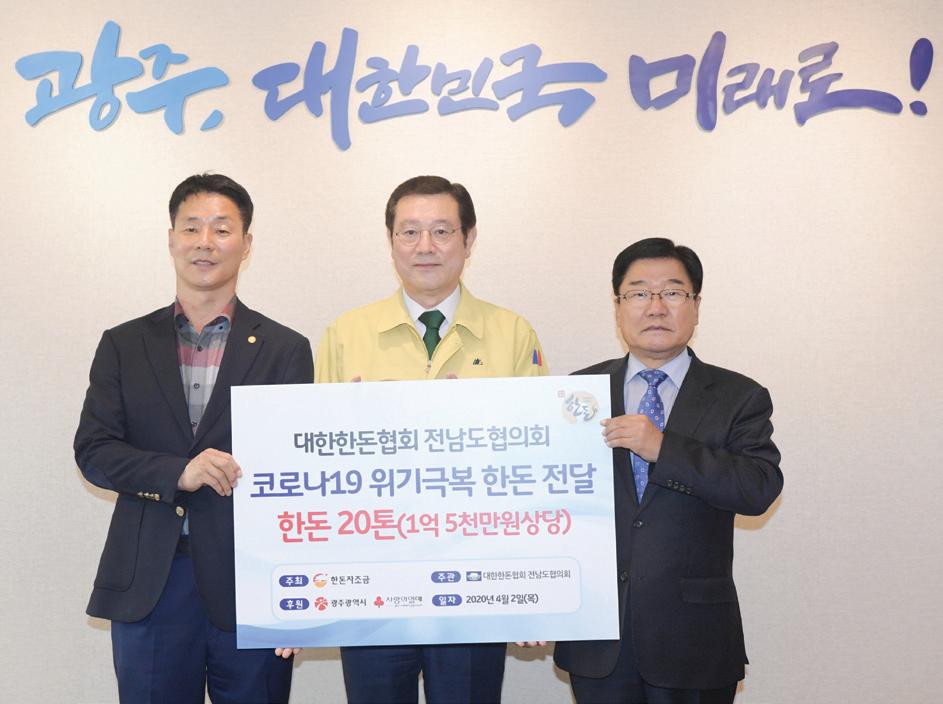
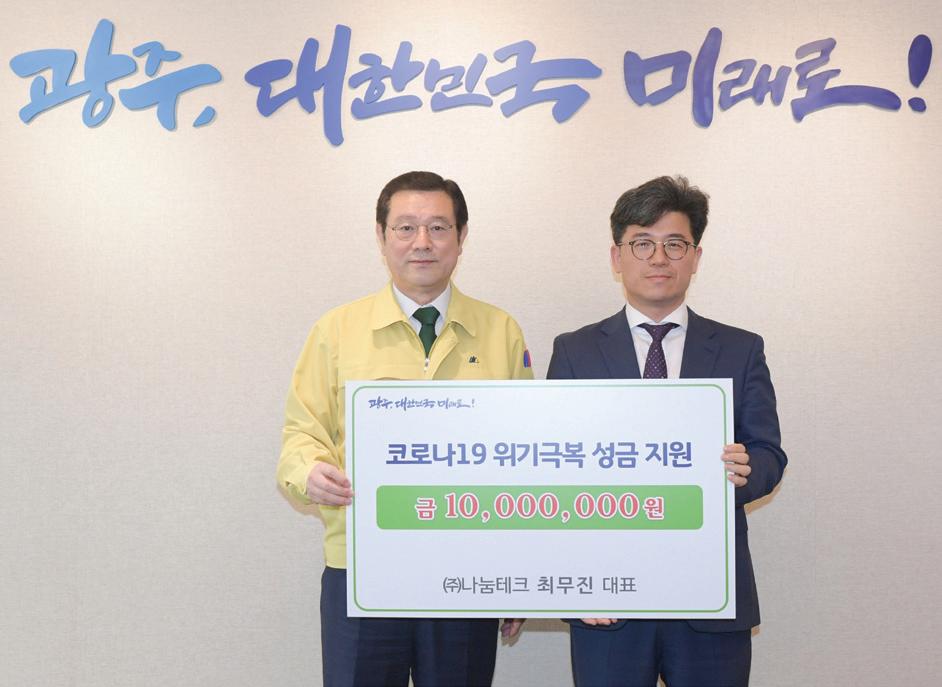
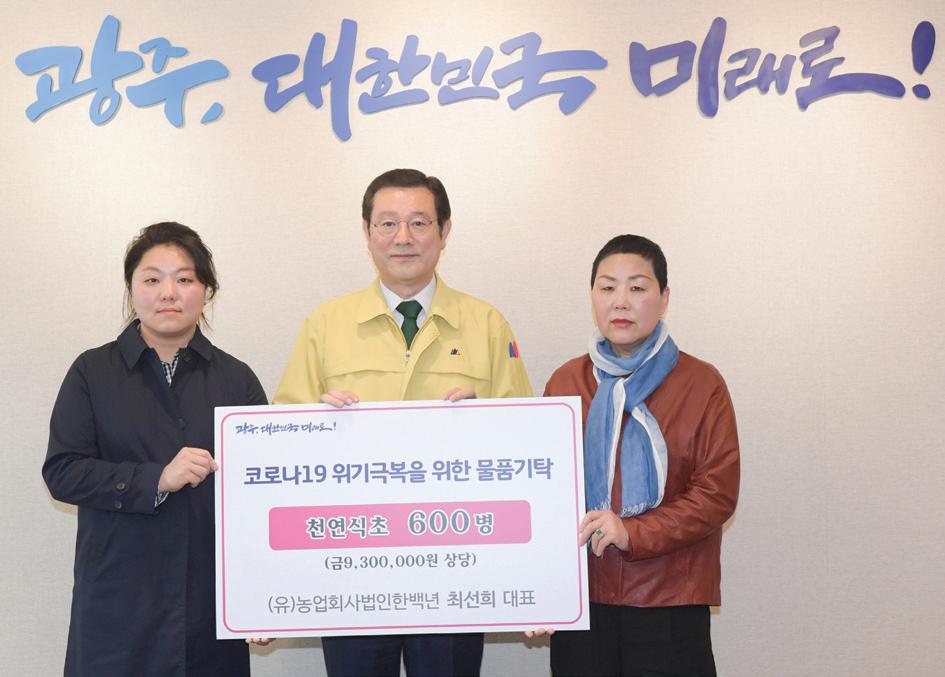
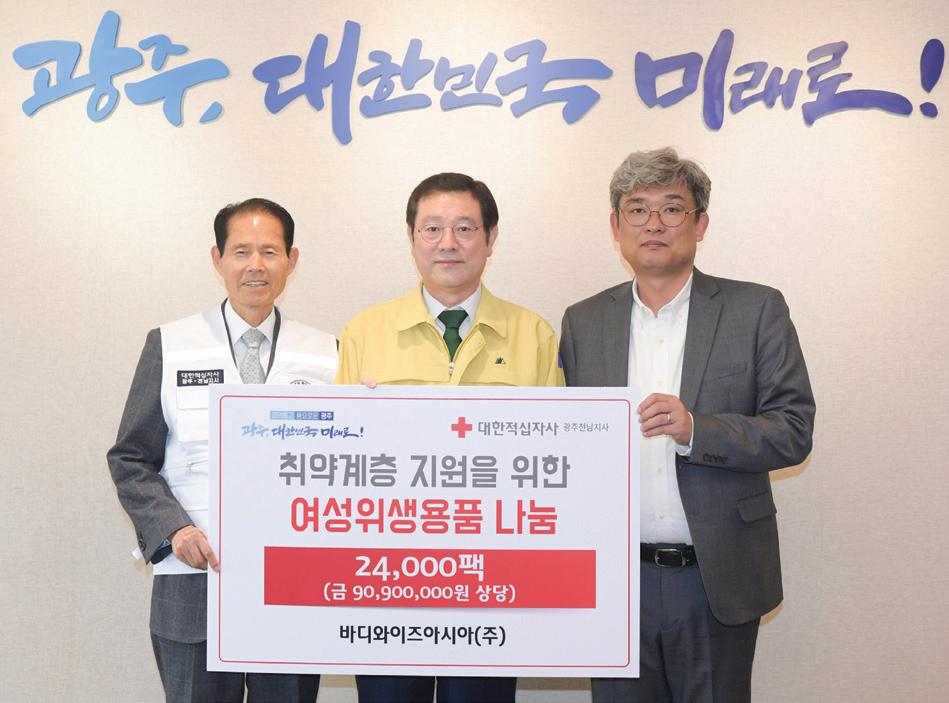
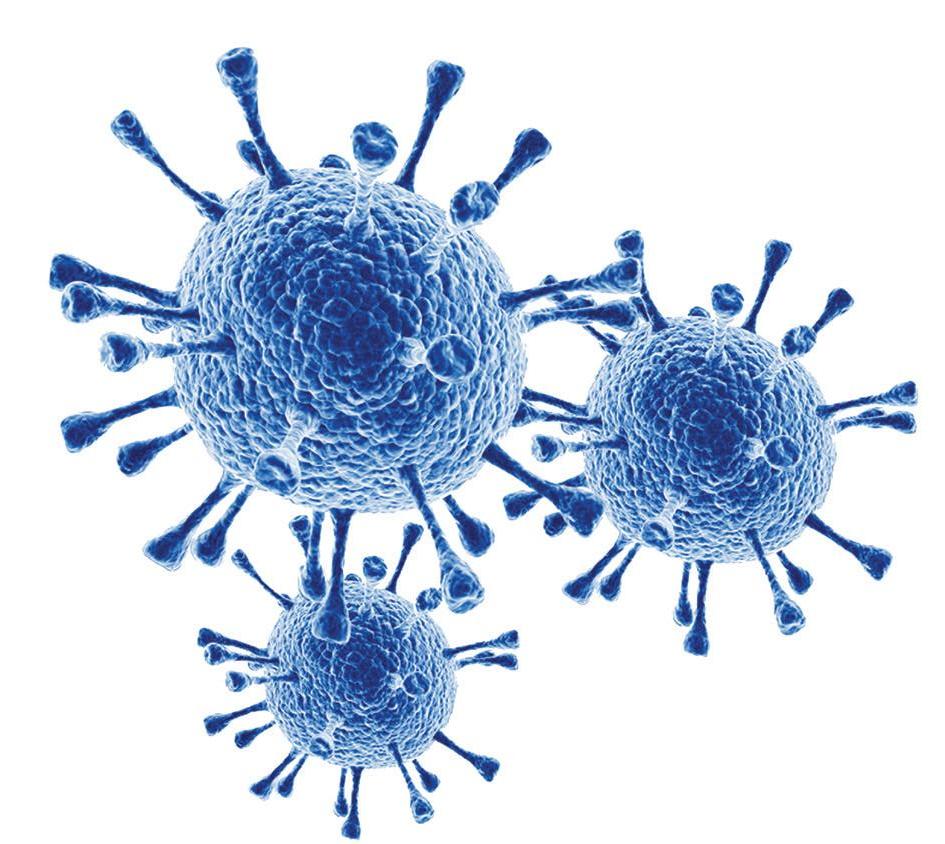
Amid the campaign of social distancing to prevent the spread of COVID-19, donations from all sectors in the region are constantly being made. On April 2, a donation ceremony was held at City Hall with Bodywise Asia Co., Nanoom Tech Co., Hanbaeknyeon Inc., and the Korean Pork Producers Association. Bodywise Asia Co., a Seoul-based company specializing in importing and selling women’s hygiene products, delivered 24,000 packs of absorbent products for the disadvantaged and teenagers. Kim Yoo-jin, CEO of Bodywise Asia Co., said, “Many people are having a difficult period as the COVID-19 situation continues, so we have donated women’s hygiene products to deliver strength to those less fortunate around us,” and added, “We will continue to donate to Yeosu, Jangheung, and other areas in South Jeolla, hoping to overcome this crisis.” The products offered by Bodywise Asia Co. will be delivered to local facilities for the disabled and the youth through Gwangju and Jeonnam branches of the Korean Red Cross. Hanbaeknyeon Inc., an agricultural corporation, donated 600 bottles of naturally fermented vinegar to help Gwangju and Daegu overcome the COVID-19 crisis. Choi Sun-hee, CEO of Hanbaeknyeon Inc., said, “We delivered natural fermented vinegar made with traditional manufacturing methods for three generations to help overcome COVID-19,” adding, “We hope that both Gwangju and Daegu citizens overcome the coronavirus crisis as soon as possible and recover their healthy daily lives.” The 600 bottles of naturally fermented vinegar will be delivered to underprivileged people in Gwangju and Daegu through the Gwangju Volunteer Center. Nanoom Tech Co., a manufacturing company specializing in medical devices, donated 10 million won as COVID-19 support to Daegu last month; they also took part in the donation ceremony. The donations delivered by Nanoom Tech Co. to the Gwangju Volunteer Center in March were 500 sets of seaweed snacks and 500 sets of handmade noodles purchased from young merchants at the 1913 Community donations for overcoming COVID-19 continue. • City Hall holds a donation ceremony. • Bodywise Asia Co. contributes 24,000 female hygiene products. • Nanoom Tech Co. donates 10 million won and Hanbaeknyeon Inc. donates 600 bottles of natural vinegar. • The Jeonnam Provincial Council of the Korean Pork Producers Association donated 20 tons of pork with plans to deliver it to the underprivileged. • Mayor Lee Young Sup states, “Strong solidarity and civic awareness is a great force in overcoming COVID-19.” Songjeong Station Market in support of revitalization of the local commercial area and to support Daegu citizens. Choi Moo-jin, CEO of Nanoom Tech Co., said, “We are happy that the donations we made to help citizens overcome the crisis also helped merchants in this region,” and added, “We are also planning to provide support for Gwangju citizens to overcome the coronavirus crisis.” The Jeonnam Provincial Council of the Korean Pork Producers Association donated 20 tons of Korean pork worth 150 million won. For the underprivileged across the country who are having a hard time due to the COVID-19 pandemic and economic recession, Korean pork farmers have made a united effort to help. The nationwide donation of pork worth three billion won will be delivered to low-income families and social welfare facilities. Chairman Oh Jae-gon of the Jeonnam Provincial Council of the Korean Pork Producers Association stated, “There are many people who have difficulties in their lives due to the economic slowdown and anxiety caused by the spread of COVID-19. We especially thank public officials, medical staff, and volunteers who work hard day and night to prevent the spread of COVID-19 and hope that this pandemic will end as soon as possible.” Mayor Lee Young Sup stated, “With the high-intensity social distancing campaign underway, warm hands are bringing the distance closer despite difficulties for everyone. He added, “A stronger sense of solidarity and a mature civic consciousness are helping us overcome the COVID-19 crisis.”
Everyday Korean
Episode 29: 재택근무 (Work from Home)
By Harsh Kumar Mishra
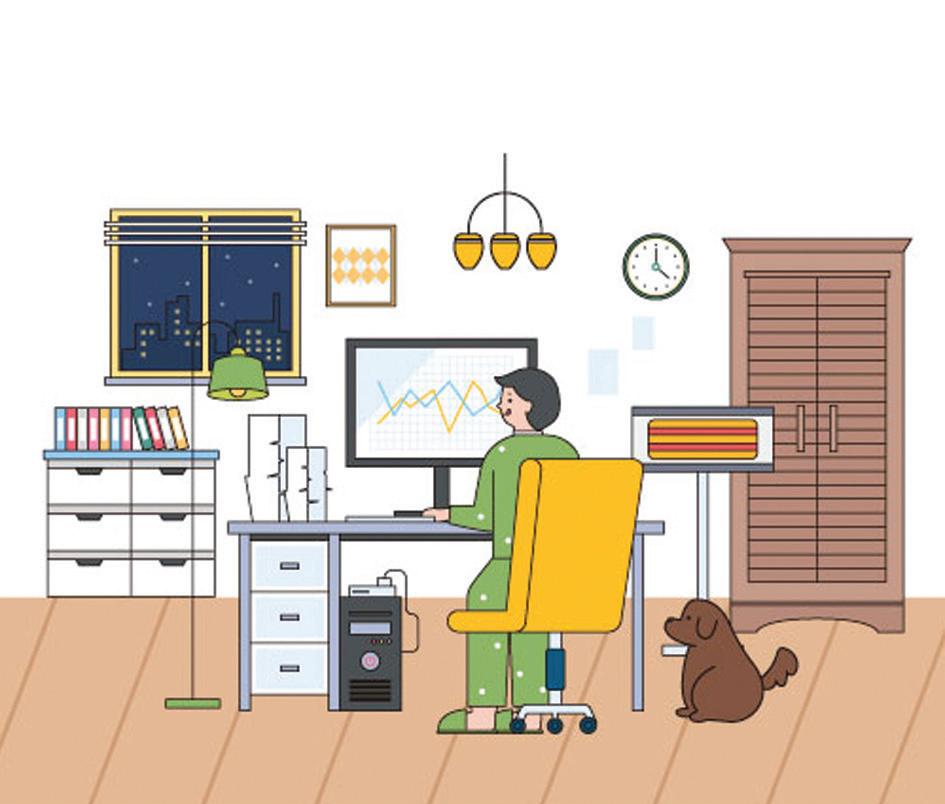
Grammar
~기로 하다: Use this with verbs to express a made decision, i.e., when you’ve “decided to do something.”
Ex: 한국 정부가 농협마트에서 마스크를 판매하기로 했어요.
The Korean government has decided to distribute masks at Nonghyup Mart.
~기는 하지만: Use this when you want to acknowledge what was said in the first part of the sentence but also want to put contrastive emphasis on the second part.
Ex: 한국 음식은 맵기는 하지만 맛있어요. Korean food indeed is spicy, but also very tasty.
Vocabulary
수업 회사 근무 편하다 출퇴근 일어나다 게으르다 집중 여우롭다 단점 class office/company work to be comfortable commute to wake up to be lazy concentration to be relaxed drawback/negative point
Vocabulary Terms Related to Work
화상 회의 보고서 신입사원 퇴직 사대 보험 경력 학력 video conference report new employee retirement Korean insurance system (4 types) work experience academic background
데지: 우리 학교에서 코로나 때문에 모든 수업을 온라인으로 하기로 했어요. [Uri hak-kyo-eseo corona ttae-mu-ne mo-deun su-eo-beul ol-lain-ro hagi-ro hae-sseo-yo.] Daisy: Due to the coronavirus, our school has decided to do all classes online. 정민: 우리 회사도 다들 재택근무하고 있어. [Uri hwe-sa-do da-deul jae-taek-geun-mu-hago is-seo.] Jeongmin: Even all our company employees are working from home.
데지: 좋겠네요. 재택근무가 편하죠? [Jo-khen-neyo. Jae-taek-geun-mu-ga pyeon-ha-jyo?] Daisy: It must be nice. Working from home is comfortable, isn’t it?
정민: 출퇴근을 안 해야 해서 편하기는 하지만 단점도 있어. [Chul-twe-geu-neul an hae-ya hae-seo pyeon-ha-gi-neun ha-ji-man dan-jeom-do is-seo.] Jeongmin: It sure is comfortable not to commute, but it also has its drawbacks.
데지: 어떤 단점이 있어요? [Eot-teon dan-jeo-mi is-seo-yo?] Daisy: What kind of drawbacks?
정민: 집에서 일하니까 늦게 일어나고, 게을러. 그리고 일하는 데 집중도 잘 안 돼. [Jib-eseo ir-ha-nik-ka neut-ke ireo-nago, ge-eul-leo. Geu-rigo ir-haneun de jip-jung-do jal an d-wae.] Jeongmin: As I work from home, I get up late and feel lazy. And I can’t concentrate on work well.
데지: 그래요? 저는 집에서 수업하는 게 여유로워서 좋아요. [Geu-rae-yo? Jeo-neun jib-eseo su-eop-ha-neun ge yeo-yu-ro-weo-seo jo-ayo.] Daisy: Really? I like taking classes from home because I feel free.

TOPIK GUIDE (topikguide.com) is the most comprehensive website devoted to the TOPIK exam. It has been helping Korean language learners pass the TOPIK (Test of Proficiency in Korean) for more than eight years. On our website, you can get all the TOPIK updates, grammar and vocabulary material, and study tips.










